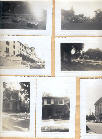
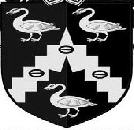
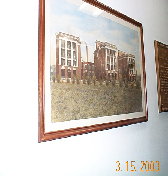
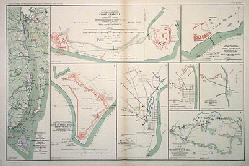
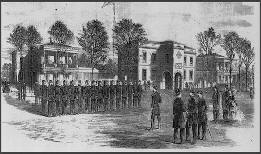
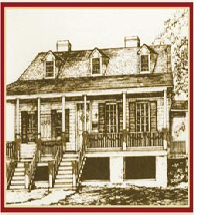



Walton crest Images of old Augusta, including the Arsenal, Meadow Garden, the Hospital, various pictures my mother took, and a Civil War map of the area
Walton Family, continued (page 8)
The descendants of George Walton, Signer of the Declaration of Independence.
Note: There are no living lineal descendants of George Walton, signer
George Walton and Dorothy Camber had two children:
Note: There are no living lineal descendants of George Walton, signer
George Walton and Dorothy Camber had two children:
Thomas Camber Walton was the eldest son of George Walton and Dorothy Camber. He was born 1776, and died 13 Dec 1803 at “Meadow Garden,” the Walton home in Augusta, GA. Thomas Camber Walton witnessed the will of Thomas Meriwether. THOMAS CAMBER WALTON, deceased; on October 3, 1804 Anderson Watkins was appointed administrator of his estate, signed by Jacob Danforth, Thos. Glascock, Sec. Thomas never married, and was a young lawyer in Augusta at the time of his death. His death devastated his father.
George Walton, Jr. was born 15 Aug 1786 in Augusta, GA, and was the only other child of George Walton, signer. He graduated from Princeton, an attorney, and he was elected to the Georgia House of Representatives to serve Richmond County in the 1810-11, 1816-19 sessions. In 1819, his cousin, Dr. Anderson Watkins, was handling some of his legal affairs in Augusta, GA: “For sale, 325 acres of land, more or less, lying near the waters of McBean, Richmond County, adjoining Job. S. Burney, Jeremiah Harris and others - taken as the property of John Turman, to satisfy an execution in favor of Anderson Watkins, Trustee of GEO. WALTON.” G. Walton is listed as living in Richmond County, GA in the 1820 Census. By 1821 they were living in Florida.
Soon after the defeat of the Seminoles he received from Andrew Jackson, in 1821, while residing at Pensacola, the appointment of Secretary of the Territory of East Florida, which office he held under Old Hickory as the Territorial Governor; and in recognition of the conspicuous pioneer part which he played in Floridian affairs, one of the counties of the State bears the name of the younger Walton. He possessed much of his father's genius, but his chief claim to distinction is derived through his daughter, Octavia, who became the foremost woman of the ante-
Steven L. Wright provided the following transcriptions: Territorial Papers of the United States, Volume 22, The Territory of Florida, by Clarence Edward Carter
Acting Governor [George] Walton (West Florida) to Governor [Andrew] Jackson [LC: Jackson Papers, Bk. 61:LS]-
Acting Governor Walton to the Secretary of State [John Quincy Adams]-
Notes from Steven Wright: The house alluded to is still standing in Pensacola and known as the Dorothy Walton house. In the lobby of the R.A. Gray building where the state archives is housed is a modern picture of this house with workers in the process of restoring it. The accompanying caption states that the house was built in 1810. If so, it must have been already standing when the Walton's came to Pensacola.
George Walton, Jr’s death was announced in the [Atlanta] Southern Confederacy, Friday, January 23, 1863 page 2 col. 2: “Colonel George Walton, a son of one of the signers of the old Declaration of Independence, died in Petersburg, VA., a few days since, aged seventy three years. He was formerly Territorial Governor of Florida, and later in life the Mayor of Mobile. He was the father of the well-
George Walton, Jr. married Sarah “Sallie“ Minge Walker (19 Jul 1792, Washington County, GA -
1) OCTAVIA Celeste Valentine WALTON (b.11 Aug 1811-
2) Robert Watkins WALTON -
OCTAVIA CELESTE VALENTINE WALTON
Octavia was the celebrated daughter of George Walton, Jr., and granddaughter of George Walton, Georgia signer of the The Declaration of Independence. Octavia was born 11 Aug 1811 at “Bellvue,” the Walker home in Augusta, GA. She died 13 Mar 1877 in Augusta, GA, and is buried in the Walker Family Cemetery.
Octavia was the celebrated daughter of George Walton, Jr., and granddaughter of George Walton, Georgia signer of the The Declaration of Independence. Octavia was born 11 Aug 1811 at “Bellvue,” the Walker home in Augusta, GA. She died 13 Mar 1877 in Augusta, GA, and is buried in the Walker Family Cemetery.
Much has been written about Octavia, and she published her own books of her travels in Europe. "Octavia became one of the most accomplished women of the 19th century, much of this being due to her early upbringing and travel. She moved with her parents in 1821 to Florida and learned to speak several languages. In 1833 she was presented to society in Washington, D.C. (age 12!) . She was a noted belle and was presented to Lafayette when he visited Mobile in 1825. She traveled extensively in the United States in 1833-
Her mother had been grooming her for the "right" marriage, and in 1836 (age 25) she married Dr. Henry S. LeVert, a physician. Throughout her brilliant social career she received various honors and compliments, among these being a poem in her name by Edgar Allen Poe; John C. Calhoun's referring to her as "the gifted daughter of the South"; and a long-
Madame LeVert's intimate friends embraced some of the world's celebrities. She was visited at her home in Mobile by Kossuth, the Hungarian patriot; Frederika Bremer, the Swedish novelist; Lady Emmeline Stuart Worley, the daughter of the Duke of Rutland, by whom she was presented to the queen on her first visit to England; Joseph Jefferson, the famous actor, and by many others of equal note. Moreover, she included among her literary correspondents men like Washington Irving, Henry Clay, Millard Fillmore, Edwin Booth, Edward Everett and Henry W. Longfellow. She also kept a scrapbook which abounded in many precious memorials of her friendships. Twice she crossed the water; and her impressions of European life are most charmingly preserved in "Souvenirs of Travel." It was at the suggestion of Lamartine that she took up the pen for the purpose of recording her memoirs. At Florence, Italy, she was the recipient of marked attentions from the Browning's; and at Ferrara she was so impressed by the manner in which the home of the poet Ariosto was preserved that she returned to America enthusiastic over the idea of purchasing Mount Vernon, and she became in the South what Mrs. Harrison Gray Otis was in the North, the leader of the movement to rescue the home of Washington.
She visited Europe in 1853 and again in 1855, and was presented at court. About this time she commenced her literary work. After the death of her husband in 1860 she remained in Mobile, where she nursed the soldiers in the hospital throughout the war. She used her influence in securing a pardon for General Beauregard, and visited the national capital in his interests. She appeared as a public reader in the principal cities of the United States in 1874-
"While the Civil War ensued, Madame LeVert remained in Mobile and aided the Confederacy. The end of the war brought an end to the society to which she was accustomed, and she eventually closed her home in Mobile and returned to Augusta. Her home there, known as "Chateau LeVert," was razed in the early 1960's. It was there that she died on March 13, 1877.
Octavia Walton and Dr. LeVert had the following children:
I hope you will read the pdf file for notes about these children (see above).
1) Octavia Walton LEVERT “Diddie” (b.20 Nov 1836-
2) Claudia Anna Eugenia LEVERT (died a child) (b.22 May 1838-
3) Sally Walker Walton LEVERT (died a child) (b.6 Apr 1841-
4) (son who died at birth) LEVERT (b.1844 d.1844)
5) Henrietta Caroline "Cara Netta" LEVERT (b.6 Dec 1846-
sp: L.A.R. (Lawrence Augustus Rigail) REAB (b.16 Dec 1844-
A) Rigail REAB (died a baby) (b.31 Aug 1870-
B) George Walton REAB (b.4 Jun 1872-
-
The two surviving children of Octavia Walton LeVert
Octavia “Diddie” Walton LeVert (eldest daughter of Octavia Walton and Dr. Henry S. LeVert): In July 1847, Octavia wrote describing her eldest daughter: "Octavia Walton," is a brunette, with glorious large dark eyes, like those of Circassion Maid, soft brown hair, and a radiant intellect." Diddie was a voracious reader, and suffered from eye trouble all of her life.
Octavia frequently traveled with her mother, and in fact accompanied her on one of her trips to Europe. In 1866, her mother wrote: "Octavia is the greatest comfort of my life, and is my chief dependence for every joy…" She continued to travel with her mother after her sister Cara Netta's marriage. Octavia (Diddie) kept house for her sister, Carra Netta, when she was so ill after the birth of George Walton Reab in 1872. Her mother Octavia wrote that she "devotes herself incessantly to care of her."
Octavia Walton Levert wrote of Diddie on Cara Netta's death: "Octavia will devote her life to George Walton (Reab), and Regial is precisely like my own child. We will live here with him and Aunt Anna, and take care of her. She has always been so affectionate to me that I feel it my sacred duty to watch over her, and I will never leave her again. Octavia is an excellent housekeeper and she has taken charge of everything, and will do everything to make Aunty and Regial comfortable." Little George Walton Reab was only three years old when his mother died, but he was not lacking in love. Octavia, Jr. became "Ma Diddie."
After her mother's death, Diddie continued managing Aunt Anna Robinson's household and caring for little George and Rigial Reab. Old and infirm, Anna died on May 1, 1878, a little over a year after Octavia's death, and her beloved "Belle Vue" passed into Rigial's hands. Not long after, he married Maria Ann Jenkins, and Diddie and Betsy moved to a house on Broad Street, their caretaking days over. The affectionate relationship between Diddie and Rigial continued, however, and Laura Reab Bowen recalls that her father, Lawrence Reab, Rigial's son by his second wife Maria, remembered his father's taking the children in the family carriage to see George's "Ma-Diddie." Their special treat was looking at the many post cards from Madame LeVert's travels.
Diddie died on July 4, 1889, twelve years after the death of her mother. Her obituary in the Augusta paper is filled with more of the life of Madame LeVert than of her own. (Her obituary and will are transcribed in the notes)
Octavia frequently traveled with her mother, and in fact accompanied her on one of her trips to Europe. In 1866, her mother wrote: "Octavia is the greatest comfort of my life, and is my chief dependence for every joy…" She continued to travel with her mother after her sister Cara Netta's marriage. Octavia (Diddie) kept house for her sister, Carra Netta, when she was so ill after the birth of George Walton Reab in 1872. Her mother Octavia wrote that she "devotes herself incessantly to care of her."
Octavia Walton Levert wrote of Diddie on Cara Netta's death: "Octavia will devote her life to George Walton (Reab), and Regial is precisely like my own child. We will live here with him and Aunt Anna, and take care of her. She has always been so affectionate to me that I feel it my sacred duty to watch over her, and I will never leave her again. Octavia is an excellent housekeeper and she has taken charge of everything, and will do everything to make Aunty and Regial comfortable." Little George Walton Reab was only three years old when his mother died, but he was not lacking in love. Octavia, Jr. became "Ma Diddie."
After her mother's death, Diddie continued managing Aunt Anna Robinson's household and caring for little George and Rigial Reab. Old and infirm, Anna died on May 1, 1878, a little over a year after Octavia's death, and her beloved "Belle Vue" passed into Rigial's hands. Not long after, he married Maria Ann Jenkins, and Diddie and Betsy moved to a house on Broad Street, their caretaking days over. The affectionate relationship between Diddie and Rigial continued, however, and Laura Reab Bowen recalls that her father, Lawrence Reab, Rigial's son by his second wife Maria, remembered his father's taking the children in the family carriage to see George's "Ma-
Diddie died on July 4, 1889, twelve years after the death of her mother. Her obituary in the Augusta paper is filled with more of the life of Madame LeVert than of her own. (Her obituary and will are transcribed in the notes)
Henrietta Caroline "Carra Netta" LAVERT, daughter of Octavia Walton LeVert
"Cara Netta LeVert was born December 6, 1846 and died in Augusta, December 15, 1876; buried in the Walker Cemetery. She married, 16 Dec 1868 in New York, her cousin, Lawrence Augustus Regail Reab (b Dec 16, 1944, d. July 3, 1909; buried in the Walker Cemetery). They lived in Augusta, GA. He was the son of George B. Reab and his first wife, Anna Euphemia Emma Re'Gail Walker, who were married in Augusta on November 23, 1839. Anna was the daughter of George M. Walker (b in VA., C. 1789; d Oct 1, 1863, in Augusta, buried in Walker Cemetery) and Mary Tyler Walker (b c. 1793 and d. in Augusta, Aug. 27, 1864, age 71). Mary T. Walker was the daughter of George and Eliza Talbot Walker."
Wedding announcement: “A very large and brilliant wedding took place last night at Trinity Chapel, at seven o'clock in the evening, it being the occasion of the marriage of Carra Netta, youngest daughter of Madame Octavia Walton LeVert, to Mr. Rigail Reab, of Augusta, Georgia. For hearty enjoyment, the number of distinguished guests present, etc, etc, this wedding may be considered one of the social events of the season. Notwithstanding the rain the large chapel was filled with hundreds of people anxious to witness the ceremony. At about half-
Madame LeVert followed, leaning on the arm of a nephew of Dr. LeVert, Dr. Skillern of Philadelphia. Madame L. was dressed in a rich pearl watered silk cut en train and décolleté, with short puffed sleeves edged with lace. The dress was trimmed with white Brussels lace and brilliants. She wore a lace under waist fastened at the throat with a cluster of diamonds. The hair was puffed. A beautiful lace shawl fell from her shoulders. The whole formed a rich and beautiful costumer.
The bridegroom and bride followed. Mr. Reab is a young looking man with mild blue eyes and alight moustache. His family is of French extraction. He was dressed in the usual suit of black. His bride, Miss Carra Netta, was very handsome, in an elaborate muslin dress, with an immense train, edged with three rows of fluting. The skirt was composed of alternate narrow tucks, and puffings of insertion. The waist was décolleté, and edged with lace. A lace underskirt fastened at the throat. A wide, white satin sash passed around the waist and fastened behind. She carried a large bouquet of flowers, and a wreath of orange blossoms fastened the veil to the head. The bride was given away by Dr. Skillern of Philadelphia. The music furnished upon this occasion was excellent.
After the ceremony at the church, the party drove to the Coleman House, where a very brilliant reception was held. (A very, very long list of the distinguished people present followed) The reception was large, fashionable and brilliant, and further details were provided of the event.
Betsy, the former slave but devoted maid of Octavia, made the muslin dress that Cara Netta wore in her wedding. An account of this was also written up in the newspaper, which remarked that the bride could have worn silk, but elected instead to wear a bridal trousseau "made and presented to her by her old Negro nurse!"
Cara Netta's first baby boy died at eight months of age, and she lost another baby after than. Then little George Walton Reab was born, but she was in delicate health, and seemingly never recovered to complete strength. In December 1876, Rigial telegraphed Octavia in New York that Cara Netta was quite ill, and Madame and Diddie left at once for Augusta. Octavia wrote her cousin Maria about Netta's death:
"When we arrived here, she was not considered dangerously ill, but soon after, the symptoms became more serious and 24 hours before her death the physician discovered that she had Bright's disease of the kidneys. Everything that the most skillful physicians and the most devoted nursing could do was bestowed upon our precious darling. But her heavenly father had summoned her to a world where suffering and pain are no more. There is not the shadow of doubt in my mind that she is now an angel in heaven.
"We buried our darling on the 8th anniversary of her marirage. It was the 16th of December 1868. On that day we had decked her so proudly and so fondly for her bridal, and on the 16th of December 1876 we draped her in ivory snow white with Japonicas on her breast and on her bosom. She was beautiful, so beautiful in Death. A lovely smile was on her lips, as though she already saw the angels and her angelic children who had gone before her. Oh Father of Heaven, give me strength to endure the agony. Never can any more happiness come to me."
Carra Netta's tombstone, an upright, marble marker, gave her name, dates of birth and death, and this simple inscription:
"A devoted wife and mother.
Home life she beautified
And thereby fulfilled the
Scriptural definition of a
Perfect woman."
Carra Netta and Lawrence Reab had three children, two of whom died as babies (one’s name is unknown):
1) Rigail “Giley” REAB (b.31 Aug 1870 -
2) George Walton REAB (b. 4 June 1872 -
George Walton Reab
George Reab was the last direct descendant of George Walton, signer.
He was born 4 June 1872 in Augusta, GA, died 6 Mar 1925,
and is buried in the Walker Family Cemetery, Augusta. He never married.
George Reab was the last direct descendant of George Walton, signer.
He was born 4 June 1872 in Augusta, GA, died 6 Mar 1925,
and is buried in the Walker Family Cemetery, Augusta. He never married.
Augusta Chronicle, March 7, 1925 - DEATH YESTERDAY OF GEO. WALTON REAB - Well known Augustan and Former Newspaperman Passes Away Following Stoke of Paralysis.
"GEORGE WALTON REAB, a well known Augustan and former newspaper man died yesterday after a prolonged illness at a local hospital. Mr. Reab has been in gradually falling health for years, but had been ill at the hospital for some weeks following a stroke of paralysis. The funeral services will take place this afternoon at 3:30 o'clock from the home of his brother, Lawrence REAB, 1323 Glenn Avenue, and he will be laid to rest in the family burying grounds in the Augusta arsenal.
Mr. Reab is survived by his (half) brother Lawrence Reab, his step mother, Mrs. M. A. Reab; and the following half sisters: Mrs. Charles Crane, Mrs. Coleman Dempsey, Mrs. Charles Rossignol all of Augusta, and Mrs. George Milam, of Miami, also a first cousin, Mrs. Emma Hilton of Augusta.
Mr. Reab was of most distinguished ancestry. His mother was the late Mrs. Anne Casanette Reab, was the only child of Madame Octavia LeVert, who was the only daughter of George Walton, one of the three signers of the Declaration of Independence from Georgia, whose home, Meadow Garden, is now kept up by the local chapter of the D.A.R. He was at one time one of the best known newspaper men in this section and worked for a long time on the Athens Banner, the Augusta Herald and the Augusta Chronicle. He was a very literary and cultured man and a constant reader, indeed probably there were few men in the state more widely read. Mr. Reab was a graduate of the University of Georgia and a member of the Delta Tau Delta fraternity.
While he was a quiet man and one who did no seek the public gaze, he was a man who was always loyal and devoted to his friends, and most highly valued by them. He had a warm and generous heart and there will be many who have kindly memories of him today, and who will be saddened that his long fight for health was in vain, and that his gentle kindly presence has gone forever."
"GEORGE WALTON REAB, a well known Augustan and former newspaper man died yesterday after a prolonged illness at a local hospital. Mr. Reab has been in gradually falling health for years, but had been ill at the hospital for some weeks following a stroke of paralysis. The funeral services will take place this afternoon at 3:30 o'clock from the home of his brother, Lawrence REAB, 1323 Glenn Avenue, and he will be laid to rest in the family burying grounds in the Augusta arsenal.
Mr. Reab is survived by his (half) brother Lawrence Reab, his step mother, Mrs. M. A. Reab; and the following half sisters: Mrs. Charles Crane, Mrs. Coleman Dempsey, Mrs. Charles Rossignol all of Augusta, and Mrs. George Milam, of Miami, also a first cousin, Mrs. Emma Hilton of Augusta.
Mr. Reab was of most distinguished ancestry. His mother was the late Mrs. Anne Casanette Reab, was the only child of Madame Octavia LeVert, who was the only daughter of George Walton, one of the three signers of the Declaration of Independence from Georgia, whose home, Meadow Garden, is now kept up by the local chapter of the D.A.R. He was at one time one of the best known newspaper men in this section and worked for a long time on the Athens Banner, the Augusta Herald and the Augusta Chronicle. He was a very literary and cultured man and a constant reader, indeed probably there were few men in the state more widely read. Mr. Reab was a graduate of the University of Georgia and a member of the Delta Tau Delta fraternity.
While he was a quiet man and one who did no seek the public gaze, he was a man who was always loyal and devoted to his friends, and most highly valued by them. He had a warm and generous heart and there will be many who have kindly memories of him today, and who will be saddened that his long fight for health was in vain, and that his gentle kindly presence has gone forever."
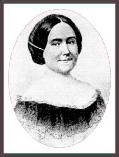
Octavia Walton LeVert
Descent:
• George Walton, signer
• George Walton, Jr.
• Octavia Walton LeVert
• “Carra Netta” Levert Reab
• George Walton Reab (1872-